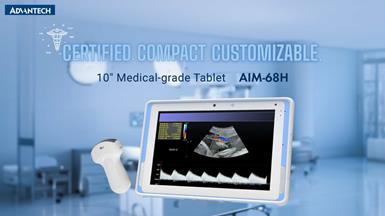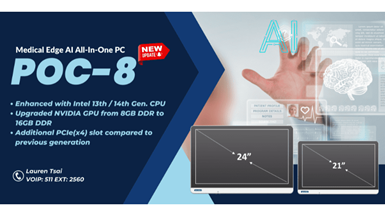Almost simultaneously, the patient’s complete medical records, the doctor’s diagnosis, and their 24-hour vital sign monitoring results were sent to the centralized nursing station. Based on the patient’s initial diagnosis and consultations via the ICU telemedicine station, the nurse administered dopamine, saving the patient’s life.
Telemedicine is a trend that has gained increasing attention in recent years. Especially in places with insufficient medical resources, telemedicine is regarded as an important innovation that overcomes geographic restrictions and minimizes the disparity between the rich and poor.
Ceiba, a startup company located in Turkey, has been providing ICU telemedicine management solutions for hospitals since 2016. Today, Ceiba has become the leading supplier of healthcare IT in Turkey and the surrounding regions.
Because ICU personnel are typically extremely busy dealing with critical patient conditions, Ceiba designs solutions for seamlessly integrating the output data of each medical device installed in the ICU.
These solutions implement the concept of ICU telemedicine. Complex data from patient monitoring equipment can be converted into comprehensible information that allows doctors to quickly understand patients’ condition. Thus, Ceiba helps clients maximize the clinical, operational, and financial performance of their ICUs.
Although these solutions have played a crucial role in integration, if they can also enable medical staff to obtain timely information, patient outcomes will be improved. With the healthcare industry currently facing resource restrictions and rising costs, more efficient and actionable solutions are required.
To address this need, Ceiba partnered with Advantech to jointly develop ICU telemedicine solutions. Advantech has experience cooperating with diverse medical institutions all over the world. Moreover, the company not only has a comprehensive product line that can be adapted to various medical applications, but is also a pioneer of the Wise Information Technology of 120 (WIT120) field.
Subsequently, Advantech’s AMiS medical cart was integrated with Ceiba solutions to provide mobile workstations that facilitate instant data transmissions from the ICU to any hospital location. To meet the strict requirements for medical instruments used in the ICU, the AMiS mobile workstation is certified to medical safety standards. This ergonomic and fully automated workstation allows medical personnel to easily access patient records and device information. Additionally, the cart’s large casters ensure easy transportation and maneuvering on various floor types. Furthermore, with the enhanced Wi-Fi connectivity, the mobile workstation is able to remain online even in places with poor Wi-Fi reception, as is common in Azerbaijan.
Advantech Sales Manager Muiayed said, “We started from the customer’s needs. Advantech’s AMiS medical cart has been undoubtedly a very important part of the entire solution. With the integration of the versatile and convenient AMiS medical cart, Ceiba has been able to support the hospital with its valuable solutions. Moreover, the hospital have provided positive feedback regarding the efficiency of the integrated mobile workstations.
Dr. Nurten Bakan of Istanbul Sancaktepe City Hospital stated that “after trialing the Advantech-Ceiba mobile workstation, doctor utilization has increased to nearly 100%. Additionally, doctors have also used the AMiS mobile workstation to conduct ward rounds and patient consultations.
For hospitalized patients, any improvement in medical care and treatment quality is a welcome development. Regarding remote/rural healthcare, telemedicine plays an essential role in overcoming geographical restrictions and resource limitations.
Innovation increases efficiency. Under the Turkish government’s efforts and direction, Turkey is well on its way to becoming a leading medical hub for Europe, the Middle East, and Africa.


